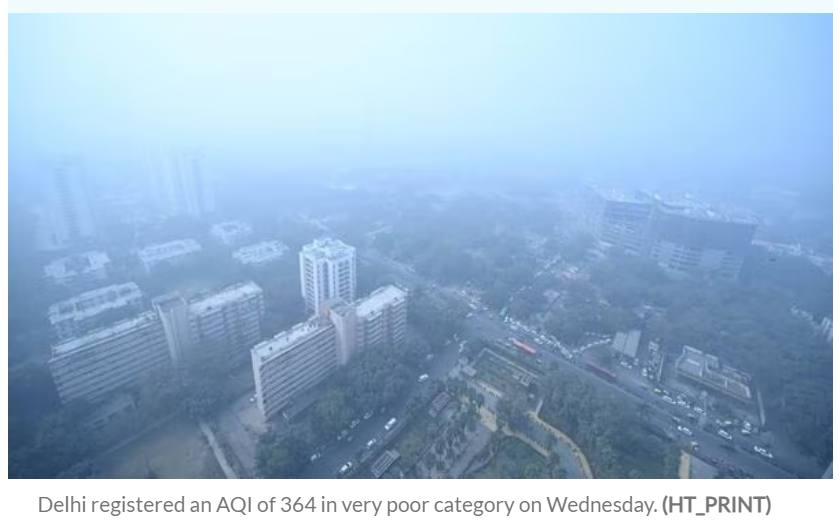The national capital has been grappling with the problem of dense fog for the past few days. This has reduced visibility considerably and has caused AQI levels to soar causing respiratory problems.

Delhi registered an AQI of 364 at 6:00 am Wednesday which lies in very poor category as per Central Pollution Control Board (CPCB) data.
The national capital has been grappling with the problem of dense fog for the past few days. This has reduced visibility considerably and has caused AQI levels to soar. Delhi secured second place today in the top 10 most polluted cities across India.
The national capital recorded a minimum temperature of 8.7 degrees Celsius and a maximum temperature of 21.4 degrees Celsius according to the Indian Meteorological Department (IMD). The weather department predicted a cloudy sky with dense fog in the morning. The city is expected to receive rain with thundershowers today. Moreover, gusty winds of around 30-40 km per hour would grace the capital during evening hours.
Various locations across Delhi registered air quality in the ‘severe’ and ‘very poor’ category today. The worst air quality was registered at Nehru Nagar where AQI stood at 445. Lodhi Road location registered the best air quality across Delhi where AQI stood at 295 which lies in the ‘poor’ range.
Let’s take a look at how locations around the National Capital Region fared in terms of pollution level. In Noida, AQI stood at 346, in Greater Noida AQI stood at 408, in Ghaziabad AQI stood at 296, in Faridabad AQI stood at 305 while in Gurugram AQI stood at 282.
Delhi’s cold weather and persistent pollution has led children to develop chest infections while asthma patients are also grappling with health problems.
Medical Director of Loknayak Jai Prakash Hospital, Dr Suresh Kumar said, “The drop in temperature, problems like chest infection, pneumonia are seen in people. Especially if we talk about children and elderly people, this winter season is troubling them more, the number of children and elderly people in hospitals is increasing,” reported ANI.
On Monday, the CAQM sub-committee for operationalisation of GRAP convened an emergency meeting. It was decided that if the AQI breached the 400 mark, restrictions under Stage III of the Centre’s Graded Response Action Plan (GRAP) would be invoked to control air pollution. However, the central government decided against employing these measures as the projected dip in air quality was “likely for a short duration” as per IMD and IITM.
Article Credit: livemint